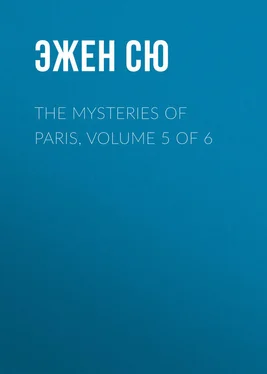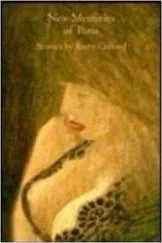Эжен Сю - The Mysteries of Paris, Volume 5 of 6
Здесь есть возможность читать онлайн «Эжен Сю - The Mysteries of Paris, Volume 5 of 6» — ознакомительный отрывок электронной книги совершенно бесплатно, а после прочтения отрывка купить полную версию. В некоторых случаях можно слушать аудио, скачать через торрент в формате fb2 и присутствует краткое содержание. Жанр: literature_19, foreign_antique, foreign_prose, на английском языке. Описание произведения, (предисловие) а так же отзывы посетителей доступны на портале библиотеки ЛибКат.
- Название:The Mysteries of Paris, Volume 5 of 6
- Автор:
- Жанр:
- Год:неизвестен
- ISBN:нет данных
- Рейтинг книги:3 / 5. Голосов: 1
-
Избранное:Добавить в избранное
- Отзывы:
-
Ваша оценка:
- 60
- 1
- 2
- 3
- 4
- 5
The Mysteries of Paris, Volume 5 of 6: краткое содержание, описание и аннотация
Предлагаем к чтению аннотацию, описание, краткое содержание или предисловие (зависит от того, что написал сам автор книги «The Mysteries of Paris, Volume 5 of 6»). Если вы не нашли необходимую информацию о книге — напишите в комментариях, мы постараемся отыскать её.
The Mysteries of Paris, Volume 5 of 6 — читать онлайн ознакомительный отрывок
Ниже представлен текст книги, разбитый по страницам. Система сохранения места последней прочитанной страницы, позволяет с удобством читать онлайн бесплатно книгу «The Mysteries of Paris, Volume 5 of 6», без необходимости каждый раз заново искать на чём Вы остановились. Поставьте закладку, и сможете в любой момент перейти на страницу, на которой закончили чтение.
Интервал:
Закладка:
"You are right, my worthy friend; for the presence of this wretch would make my terrible recollections even still more distressing, connected as they are with incurable griefs, – from my father's death to that of my daughter. I know not how it is, but as I advance in life the more I seem to miss that dear child. How I should have adored her! How very dear and precious to me she would have been, this offspring of my first love, of my earliest and purest beliefs – or, rather, my young illusions! I should have poured out on this innocent creature those treasures of affection of which her hateful mother is so unworthy; and it seems to me that, as I have dreamt, this child, by the beauty of her mind, the charm of her qualities, would have soothed and softened all my griefs, all these pangs of remorse, which are, alas, attached to her fatal birth."
"Monseigneur, I see with grief the increasing empire which these regrets, as vain as they are bitter, assume over your mind."
After some moments' silence, Rodolph said to Murphy:
"I will now make a confession to you, my old friend. I love – yes, I passionately love – a woman worthy of the noblest, the most devoted affection. Since my heart has again expanded to all the sweetness of love, since I am thus again affected by tender emotions, I feel more deeply than ever the loss of my daughter. I might have feared that an attachment of the heart would weaken the bitterness of my regrets. It is not so; all my loving qualities – my affections – are but the keener. I feel myself better, more charitable; and more than ever is it afflicting to me not to have my daughter to adore."
"Nothing more easily explained, monseigneur, – forgive me the comparison, – but, as certain men have a joyous and benevolent intoxication, so you have good and generous love."
"Still, my hatred of the wicked has become more intense; my aversion for Sarah increases, in proportion, no doubt, to the grief I experience at my daughter's death. I imagine to myself that that wretched mother must have neglected her, and that, when once her ambitious hopes were ruined by my marriage, the countess, in her pitiless selfishness, abandoned our daughter to mercenary hands, and, perhaps, my child died from actual neglect. It is my fault, also. I did not then think of the sacred duties which paternity imposes. When Sarah's real character was suddenly revealed to me, I ought instantly to have taken my daughter from her, and watched over her with love and anxiety. I ought to have foreseen that the countess would make but a very unnatural mother. It is my fault, – yes, indeed, my fault."
"Monseigneur, grief distracts you! Could you, after the sad event you know of, delay for a day the long journey imposed on you, as – "
"As an expiator! You are right, my friend," said Rodolph, greatly agitated.
"You have not heard anything of the Countess Sarah since my departure, monseigneur?"
"No; since those infamous plots which twice nearly destroyed Madame d'Harville, I have heard nothing of her. Her presence here is hateful to me, – oppresses me; it seems as though my evil demon was near me, and some new misfortune threatens me."
"Patience, patience, monseigneur! Fortunately Germany is forbidden ground to her, and Germany awaits us."
"Yes, we shall go very soon. At least, during my short residence in Paris, I shall have accomplished a sacred vow, and have made some steps in the meritorious path which an august and merciful will has traced for my redemption. As soon as Madame Georges's son is restored to her tender arms, free and innocent; as soon as Jacques Ferrand shall be convicted and punished for his crimes; as soon as I am assured of the good prosperity of all the honest and hard-working creatures who, by their resignation, courage, and probity, have deserved my interest, we will return to Germany, and then my journey will not have been wholly unfruitful."
"Particularly if you achieve the exposure of that abominable wretch, Jacques Ferrand, monseigneur, – the angular stone, the pivot on which turn so many crimes."
"Although the end justifies the means, and scruples with such a scoundrel are absurd, yet I sometimes regret that I have allowed Cecily to become an instrument in working out this just and avenging reparation."
"She ought to be here very shortly."
"She has arrived."
"Cecily?"
"Yes; I refused to see her. De Graün has given her ample instructions, and she has promised to comply with them."
"Will she keep that promise?"
"Why, everything conspires to make me think so. There is the hope of ameliorating her future condition, and the fear of being instantly sent back to Germany to prison; for De Graün will not lose sight of her, and the least defection on her part will cause her being handed over to justice."
"True, she comes here as an escaped criminal, and when we know the crimes that have led to her perpetual imprisonment, she would be at once surrendered to our demand."
"And then, even if it were not her interest to aid our schemes, the task which is assigned to her being one which can only be effected by stratagem, perfidy, and the most devilish seduction, Cecily must be (and the baron assures me she really is) overjoyed at such an opportunity for playing off those infernal advantages with which she is so liberally endowed."
"Is she as handsome as she was, monseigneur?"
"De Graün declares that she is more attractive than ever; he told me that he was really quite dazzled at her beauty, to which the Alsatian costume she had chosen gave even more piquancy. The glance of this devil in petticoats, he says, has still the same really magic expression."
"Why, monseigneur, I have never been what is called a dissipated fellow, a man without heart or conduct, but if at twenty years of age I had met with Cecily, even knowing her then to be as dangerous, as wicked as I do now, I assure you I would not have answered for myself, if I had been for any time exposed to the fire of her large, black, and brilliant eyes, sparkling in the centre of her pale and ardent countenance. Yes, by heaven! I dare not think of the extremities into which so fatal an amour might have urged me."
"I am not astonished, my dear Murphy, for I know this woman. Moreover, the baron was really frightened at the quickness with which Cecily understood – or, rather guessed – the part, at once inciting and platonic, which she was to play with the notary."
"But will she, think you, be introduced as easily as you wish, monseigneur, by the intervention of Madame Pipelet? Individuals like Jacques Ferrand are so suspicious."
"I had relied, with reason, on the sight of Cecily to overcome and dissipate the notary's distrust."
"What! Has he already seen her?"
"Yesterday. And from what Madame Pipelet told me, I have no doubt but he was fascinated by the creole, for he instantly took her into service."
"Then, monseigneur, the game is won, and ours."
"I hope so. A ferocious cupidity, a brutal passion, have impelled the injurer of Louise Morel to the most odious crimes. It is in his passion and his cupidity that he shall find the terrible punishment of his crimes, – a punishment which, moreover, shall not be without fruit for his victims, for you know the aim of all the Creole's wiles."
"Cecily! Cecily! Never did greater wickedness, never more dangerous corruption, never blacker soul have served for the accomplishment of a more strict morality, a more just result! And David, monseigneur, what does he say to this arrangement?"
"Approves of everything. At the pitch of contempt and horror which he has reached for this creature, he sees in her only the instrument of a just vengeance. 'If this accursed woman ever could deserve any commiseration after all the ill she has done me,' he said to me, 'it would be by devoting herself to the remorseless punishment of this scoundrel, whose exterminating demon she may become.'"
Читать дальшеИнтервал:
Закладка:
Похожие книги на «The Mysteries of Paris, Volume 5 of 6»
Представляем Вашему вниманию похожие книги на «The Mysteries of Paris, Volume 5 of 6» списком для выбора. Мы отобрали схожую по названию и смыслу литературу в надежде предоставить читателям больше вариантов отыскать новые, интересные, ещё непрочитанные произведения.
Обсуждение, отзывы о книге «The Mysteries of Paris, Volume 5 of 6» и просто собственные мнения читателей. Оставьте ваши комментарии, напишите, что Вы думаете о произведении, его смысле или главных героях. Укажите что конкретно понравилось, а что нет, и почему Вы так считаете.












